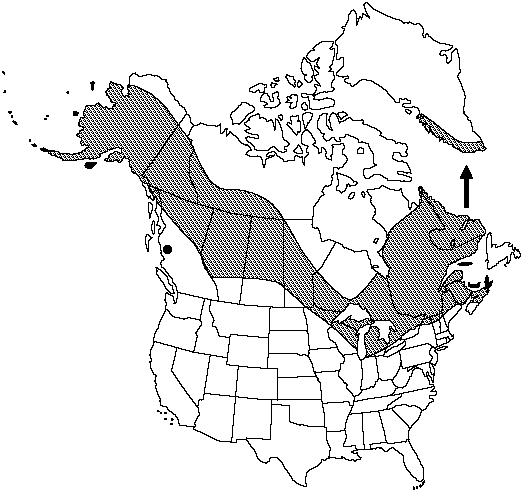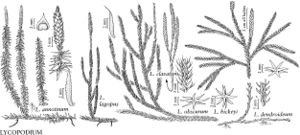FNA>Volume Importer |
FNA>Volume Importer |
| Line 32: |
Line 32: |
| | }}<!-- | | }}<!-- |
| | | | |
| − | --><span class="statement" id="st-d0_s0" data-properties="stem orientation"><b>Horizontal </b>stems on substrate surface.</span> <span class="statement" id="st-d0_s1" data-properties="shoot orientation;shoot arrangement or growth form;shoot diameter;main shoot branch prominence;main shoot branch atypical count;main shoot branch count"><b>Upright </b>shoots clustered, shoots 0.5–0.8 cm diam., dominant main shoot branches 2–3 (–4), mostly in lower 1/2.</span> <span class="statement" id="st-d0_s2" data-properties="lateral branchlet count;shoot shape;shoot orientation"><b>Lateral </b>branchlets few and like upright shoots;</span> <span class="statement" id="st-d0_s3" data-properties="bud constriction duration;bud constriction shape;bud constriction prominence;shoot width;branch orientation">annual bud constrictions abrupt and conspicuous, shoots 0.5–0.8 cm wide, branches mostly erect.</span> <span class="statement" id="st-d0_s4" data-properties="leaf orientation;leaf orientation;leaf orientation;leaf size;leaf coloration;leaf length;leaf width"><b>Leaves </b>ascending to appressed, medium green, 3–5 X 0.4–0.7 mm;</span> <span class="statement" id="st-d0_s5" data-properties="margin architecture or shape">margins entire;</span> <span class="statement" id="st-d0_s6" data-properties="hair tip size or width;hair tip some measurement">apex with narrow hair tip 1–3 mm.</span> <span class="statement" id="st-d0_s7" data-properties="peduncle some measurement;peduncle architecture;pseudowhorl arrangement or density;leaf fixation or orientation"><b>Peduncles </b>3.5–12.5 cm, with remote pseudowhorls of appressed leaves, unbranched.</span> <span class="statement" id="st-d0_s8" data-properties="strobilus architecture or arrangement or growth form;strobilus length;strobilus width"><b>Strobili </b>solitary (if double, usually nearly sessile), 20–55 X 3–5 mm.</span> <span class="statement" id="st-d0_s9" data-properties="sporophyll some measurement"><b>Sporophylls </b>1.5–2.5 mm, apex rather gradually reduced to hair tip.</span> <span class="statement" id="st-d0_s10" data-properties="apex size;2n chromosome count">2n = 68.</span><!-- | + | --><span class="statement" id="st-undefined" data-properties=""><b>Horizontal </b>stems on substrate surface. <b>Upright</b> shoots clustered, shoots 0.5–0.8 cm diam., dominant main shoot branches 2–3(–4), mostly in lower 1/2. <b>Lateral</b> branchlets few and like upright shoots; annual bud constrictions abrupt and conspicuous, shoots 0.5–0.8 cm wide, branches mostly erect. <b>Leaves</b> ascending to appressed, medium green, 3–5 × 0.4–0.7 mm; margins entire; apex with narrow hair tip 1–3 mm. <b>Peduncles</b> 3.5–12.5 cm, with remote pseudowhorls of appressed leaves, unbranched. <b>Strobili</b> solitary (if double, usually nearly sessile), 20–55 × 3–5 mm. <b>Sporophylls</b> 1.5–2.5 mm, apex rather gradually reduced to hair tip. <b>2n</b> = 68.</span><!-- |
| | | | |
| | -->{{Treatment/Body | | -->{{Treatment/Body |
| Line 61: |
Line 61: |
| | |publication year=1953 | | |publication year=1953 |
| | |special status= | | |special status= |
| − | |source xml=https://jpend@bitbucket.org/aafc-mbb/fna-fine-grained-xml.git/src/287ef3db526bd807d435a3c7423ef2df1e951227/V2/V2_650.xml | + | |source xml=https://jpend@bitbucket.org/aafc-mbb/fna-data-curation.git/src/9216fc802291cd3df363fd52122300479582ede7/coarse_grained_fna_xml/V2/V2_650.xml |
| | |genus=Lycopodium | | |genus=Lycopodium |
| | |species=Lycopodium lagopus | | |species=Lycopodium lagopus |
| − | |2n chromosome count=68
| |
| − | |apex size=reduced
| |
| − | |branch orientation=erect
| |
| − | |bud constriction duration=annual
| |
| − | |bud constriction prominence=conspicuous
| |
| − | |bud constriction shape=abrupt
| |
| − | |hair tip size or width=narrow
| |
| − | |hair tip some measurement=1mm;3mm
| |
| − | |lateral branchlet count=few
| |
| − | |leaf coloration=green
| |
| − | |leaf fixation or orientation=appressed
| |
| − | |leaf length=3mm;5mm
| |
| − | |leaf orientation=ascending;appressed
| |
| − | |leaf size=medium
| |
| − | |leaf width=0.4mm;0.7mm
| |
| − | |main shoot branch atypical count=3;4
| |
| − | |main shoot branch count=2;3
| |
| − | |main shoot branch prominence=dominant
| |
| − | |margin architecture or shape=entire
| |
| − | |peduncle architecture=unbranched
| |
| − | |peduncle some measurement=3.5cm;12.5cm
| |
| − | |pseudowhorl arrangement or density=remote
| |
| − | |shoot arrangement or growth form=clustered
| |
| − | |shoot diameter=0.5cm;0.8cm
| |
| − | |shoot orientation=upright;upright
| |
| − | |shoot shape=like
| |
| − | |shoot width=0.5cm;0.8cm
| |
| − | |sporophyll some measurement=1.5mm;2.5mm
| |
| − | |stem orientation=horizontal
| |
| − | |strobilus architecture or arrangement or growth form=solitary
| |
| − | |strobilus length=20mm;55mm
| |
| − | |strobilus width=3mm;5mm
| |
| | }}<!-- | | }}<!-- |
| | | | |
| | -->[[Category:Treatment]][[Category:Lycopodium]] | | -->[[Category:Treatment]][[Category:Lycopodium]] |
Horizontal stems on substrate surface. Upright shoots clustered, shoots 0.5–0.8 cm diam., dominant main shoot branches 2–3(–4), mostly in lower 1/2. Lateral branchlets few and like upright shoots; annual bud constrictions abrupt and conspicuous, shoots 0.5–0.8 cm wide, branches mostly erect. Leaves ascending to appressed, medium green, 3–5 × 0.4–0.7 mm; margins entire; apex with narrow hair tip 1–3 mm. Peduncles 3.5–12.5 cm, with remote pseudowhorls of appressed leaves, unbranched. Strobili solitary (if double, usually nearly sessile), 20–55 × 3–5 mm. Sporophylls 1.5–2.5 mm, apex rather gradually reduced to hair tip. 2n = 68.
Habitat: More or less exposed, grassy fields and openings in second-growth woods
Elevation: 50–1500 m
Distribution
Greenland, Alta., B.C., Man., N.B., Nfld., N.W.T., N.S., Ont., P.E.I., Que., Sask., Yukon, Alaska, Maine, Mich., Minn., N.H., N.Y., Vt., Wis., Eurasia.
Discussion
Lycopodium lagopus is generally more northern than its sister species, L. clavatum (W. J. Cody and D. M. Britton 1989). Where they come together, however, they can grow side by side (even in southern Michigan) and maintain their distinctions.
Selected References
None.

